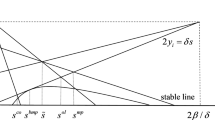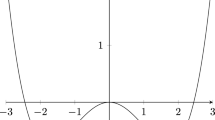Abstract
In this paper, we obtain the discrete optimality system of an optimal harvesting problem. While maximizing a combination of the total expected utility of the consumption and of the terminal size of a population, as a dynamic constraint, we assume that the density of the population is modeled by a stochastic quasi-linear heat equation. Finite-difference and symplectic partitioned Runge–Kutta (SPRK) schemes are used for space and time discretizations, respectively. It is the first time that a SPRK scheme is employed for the optimal control of stochastic partial differential equations. Monte-Carlo simulation is applied to handle expectation appearing in the cost functional. We present our results together with a numerical example. The paper ends with a conclusion and an outlook to future studies, on further research questions and applications.



Similar content being viewed by others
References
Alvarez L, Shepp L (1998) Optimal harvesting of stochastically fluctuating populations. J Math Biol 37:155–177
Barth A, Lang A (2012) Simulation of stochastic partial differential equations using finite element methods. Stoch Int J Probab Stoch Process 84(2–3):217–231
Bismut JM (1973) Conjugate convex functions in optimal stochastic control. J Math Anal Appl 44:384–404
Bismut JM (1978) An introductory approach to duality in optimal stochastic control. SIAM Rev 20(1):61–78
Bonnans JF, Laurent-Varin J (2006) Computation of order conditions for symplectic partitioned Runge–Kutta schemes with application to optimal control. Numerische Mathematik 103(1):1–10
Burrage K, Burrage PM (1999) Order conditions of stochastic Runge–Kutta methods by B-series. SIAM J Numer Anal 38:1626–1646
Burrage PM (1999) Runge–Kutta methods for stochastic differential equations. PhD Thesis, Department of Mathematics, University of Queensland, Australia
Butcher JC (2003) Numerical methods for ordinary differential equations. Wiley, West Sussex
Clark CW (1931) Mathematical bioeconomics: the optimal management of renewable resources, 2nd edn. Wiley, New York
Debrabant K, Kværnø A (2008/2009) B-series analysis of stochastic Runge-Kutta methods that use an iterative scheme to compute their internal stage values. SIAM J Numer Anal 47(1):181–203
Debrabant K, Rößler A (2008) A Classification of stochastic Runge-Kutta methods for the weak approximation of stochastic differential equations. Math Comput Simul 77(4):408–420
Dontchev AL, Hager WW, Veliov VM (2001) Second-order Runge–Kutta approximations in control constrained optimal control. SIAM J Numer Anal 38(1):202–226
Fadhel SF, Abdulamear AA (2011) Explicit Runge–Kutta methods for solving stochastic differential equations. J Basrah Res Sci 37(4):300–313
Fleming WH, Rishel RW (1975) Deterministic and stochastic optimal control. Springer, New York
Fleming WH, Soner HM (1993) Controlled Markov processes and viscosity solutions. Springer, New York
Glasserman P (2004) Monte-Carlo methods in financial engineering. Springer, New York
Hager WW (2000) Runge–Kutta methods in optimal control and the transformed adjoint system. Numerische Mathematik 87(2):247–282
Itô K (1944) Stochastic integral. Proc Imperial Acad Tokyo 20:519–524
Jentzen A, Kloeden PE (2009) The numerical approximation of stochastic partial differential equations. Milan J Math 77:205–244
Kaya CY (2010) Inexact restoration for Runge–Kutta discretization of optimal control problems. SIAM J Numer Anal 48(4):1492–1517
Kloeden PE, Platen E (1999) Numerical solution of stochastic differential equations, vol 21, 2nd edn. Springer, Berlin
Korn R, Korn E, Kroisandt G (2010) Monte-Carlo methods and models in finance and insurance. Chapman and Hall/CRC Financial Mathematics Series. CRC Press, Boco Raton. ISBN 9781420076196
Kroese DP, Taimre T, Botev ZI (2011) Handbook of Monte-Carlo methods. Wiley series in probability and statistics. Wiley, New York
Kushner HJ, Dupuis PG (1992) Numerical methods for stochastic control problems in continuous time. Springer, New York
Kunita H (1990) Stochastic flows and stochastic differential equations, vol 24. Studies in advanced mathematics. Cambridge University Press, Cambridge
Lungu E, Øksendal B (1997) Optimal harvesting from a population in a stochastic crowded environment. Math Biosci 145:47–75
Lungu E, Øksendal B (2001) Optimal harvesting from interacting populations in a stochastic environment. BERNOULLI 7:527–539
Øksendal B (2005) Optimal control of stochastic partial differential equations. Stoch Anal Appl 23:165–179
Øksendal B, Våge G, Zhao HZ (2000) Asymptotic properties of the solutions to stochastic KPP equations. Proc R Soc Edinb 130(6):1363–1381
Øksendal B, Våge G, Zhao HZ (2001) Two properties of stochastic KPP equations: ergodicity and pathwise property. Nonlinearity 14:639–662
Peng S, Wu Z (1999) Fully coupled forward-backward stochastic differential equations and applications to optimal control. SIAM J Control Optim 37:825–843
Peng S (1990) A general stochastic maximum principle for optimal control problems. SIAM J Control Optim 28:966979
Pinheiro S (2016) Optimal harvesting for a logistic growth model with predation and a constant elasticity of variance. Ann Oper Res :1–20
Rößler A (2006) Rooted tree analysis for order conditions of stochastic Runge–Kutta methods for the weak approximation of stochastic differential equations. Stoch Anal Appl 24(1):97–134
Rößler A (2010) Runge–Kutta methods for the strong approximation of solutions of stochastic differential equations. SIAM J Numer Anal 48(3):922–952
Sanz-Serna JM (2016) Symplectic Runge–Kutta schemes for adjoint equations, automatic differentiation, optimal control, and more. SIAM Rev 58(1):3–33
Schulstok B (1998) Optimal income by harvesting under uncertainty. Cand Scient thesis, University of Oslo
Yılmaz F, Öz H, Weber GW (2015) Simulation of stochastic optimal control problems with symplectic partitioned Runge–Kutta scheme. Dyn Contin Discret Impuls Syst Ser B Appl Algoritm 22:425–440
Yong J, Zhou XY (1999) Stochastic Controls: Hamiltonian Systems and HJB Equations. Applications of mathematics, Springer, New York
Yoshida H (1990) Construction of higher order symplectic integrators. Phys Lett A 150:262–268
Author information
Authors and Affiliations
Corresponding author
Rights and permissions
About this article
Cite this article
Öz Bakan, H., Yılmaz, F. & Weber, GW. A discrete optimality system for an optimal harvesting problem. Comput Manag Sci 14, 519–533 (2017). https://doi.org/10.1007/s10287-017-0286-5
Received:
Accepted:
Published:
Issue Date:
DOI: https://doi.org/10.1007/s10287-017-0286-5




